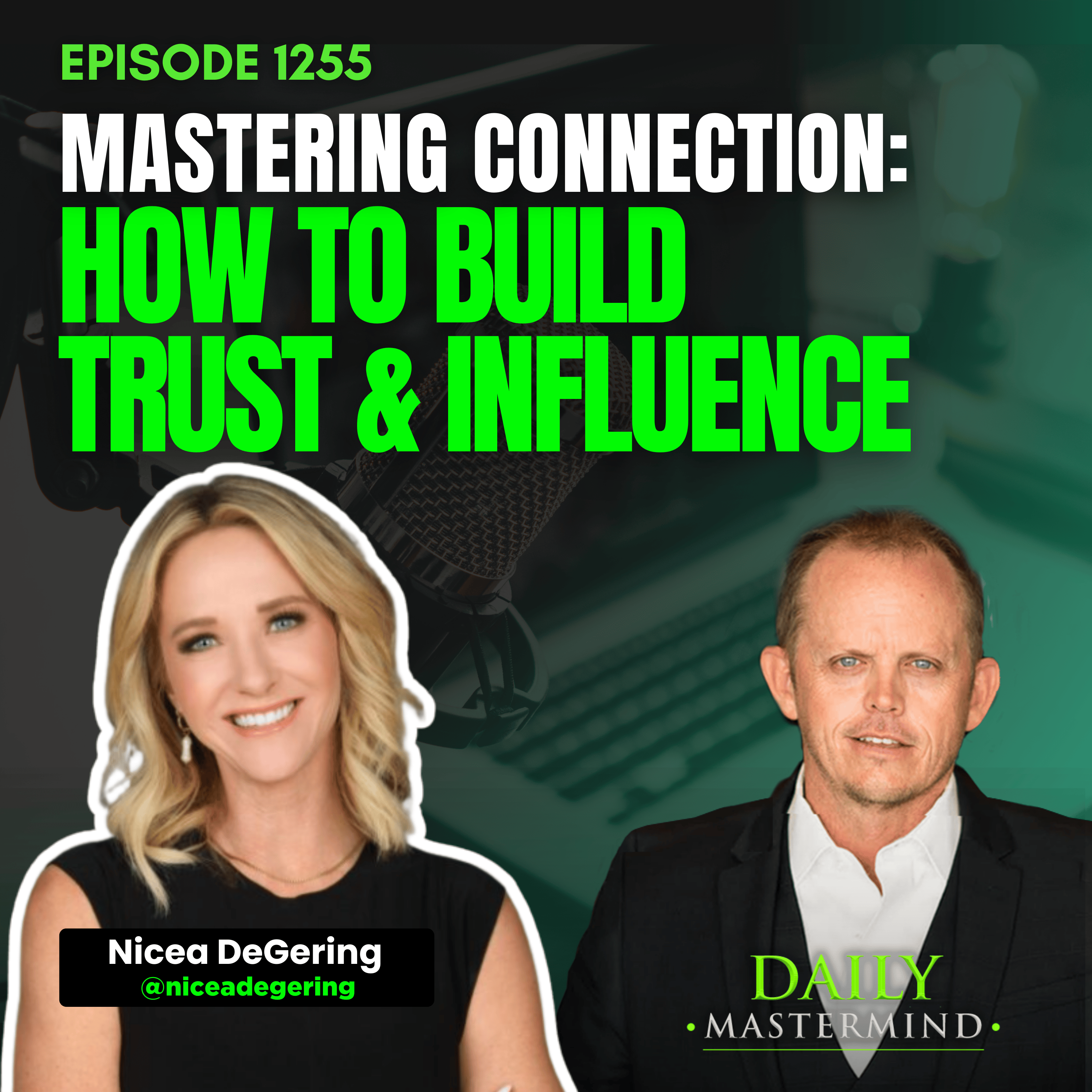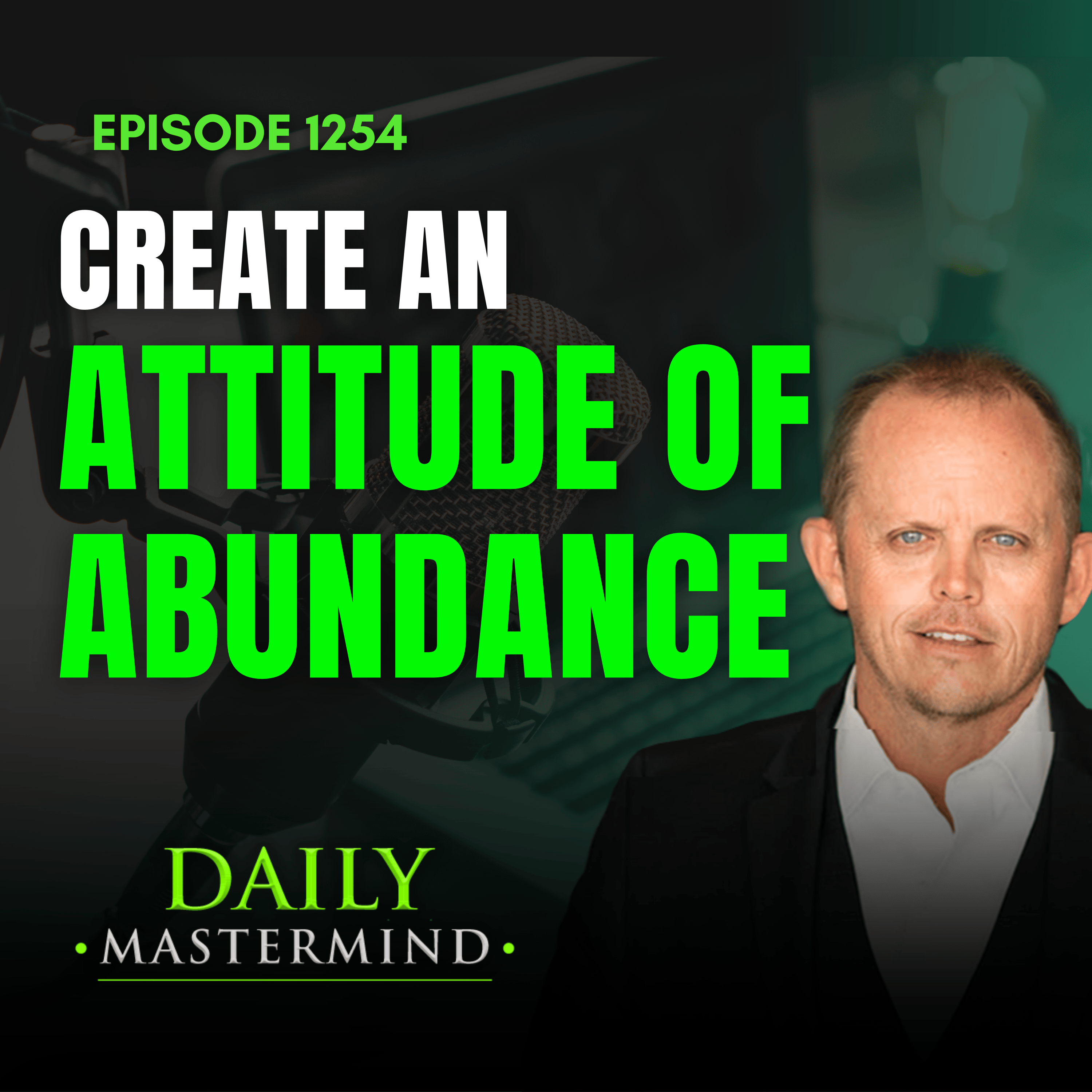.png)
Building Unshakeable Confidence: Overcoming Imposter Syndrome
In this episode of The Daily Mastermind, George Wright III discusses the final foundational principles for achieving clarity and confidence in personal and business growth. He focuses on the critical topic of confidence, exploring how imposter syndrome can impede progress and how to develop true, deep-seated confidence. George introduces a three-part framework called the Confidence Code, comprising acceptance, alignment, and action, to help listeners build unshakeable confidence. He emphasizes that confidence is a skill developed through action and alignment with one's future identity. By trusting their ability to adapt and by leading with certainty, individuals can inspire and influence others effectively.
Building Unshakeable Confidence: Overcoming Imposter Syndrome
All right, welcome back to The Daily Mastermind. George Wright III here with your daily dose of inspiration, motivation, and education.
Today, we’re breaking down the final day of the foundation we’ve been laying for clarity and confidence—two of the most essential ingredients for growing your life and business.
This week has been all about setting that foundation. On Monday, we talked about creating clarity for your vision. On Wednesday, we discussed shifting your identity. And today, I want to talk to you about confidence.
The reason is simple—today’s world is filled with noise, comparison, and distractions. Your degree of confidence will directly influence your success, your leadership, and your peace of mind.
And I’m not talking about surface-level confidence, the kind people show off on social media. I’m talking about deep-rooted confidence—the kind that comes from knowing who you are, trusting your ability, and leading with certainty even when the path ahead isn’t clear.
One of the biggest obstacles standing between you and that kind of confidence is something we’ve all faced: imposter syndrome.
Understanding Imposter Syndrome
Imposter syndrome—that quiet voice that says, “Are you sure you belong here? Are you sure you’re good enough? Can you really lead at this level?”
We all experience it. I’ve seen it affect high-level entrepreneurs and 7-, 8-, and 9-figure executives. And yes, I’ve felt it myself.
Imposter syndrome doesn’t usually show up as fear or hesitation. It shows up as self-doubt—those moments when you should be stepping up, but instead you pull back.
You land a big opportunity, and suddenly your mind asks, “Do I really deserve this?” You succeed at something, and your brain whispers, “You just got lucky.” You’re asked to lead, and you wonder, “Why me?”
Here’s the ironic part—the people who struggle most with imposter syndrome are usually the ones who are high achievers. They’re capable, driven, and constantly pushing boundaries.
When you evolve beyond where you’ve been, your identity hasn’t yet had time to catch up. That gap—the space between who you were and who you’re becoming—is where imposter syndrome lives.
I’ve been there many times.
But here’s what most people don’t realize: imposter syndrome isn’t a sign that you’re not qualified. It’s a sign that you’re growing.
It means you’re expanding into new territory. It means you’re doing something right. People who aren’t growing rarely feel imposter syndrome. People who settle never deal with it.
The first step is to understand that you’re not an imposter—you’re just uncomfortable because you’re evolving. You’re stepping into roles you’ve never played before. You’re accessing levels you’ve never reached.
Imposter syndrome doesn’t mean you don’t belong. It means you’re finally playing a bigger game.
The goal isn’t to eliminate imposter syndrome—it’s to stop listening to it. Because as long as you’re growing, that voice will always be there.
“Imposter syndrome isn’t proof you don’t belong—it’s proof you’re growing.”
Building True Confidence
Now let’s talk about what confidence really is.
Confidence is not a personality trait. It’s not something you’re born with. It’s not reserved for extroverts or natural leaders. Confidence is a skill.
It’s a muscle—a habit that’s built through action, through experience, and through alignment with the person you want to become.
If you’ve ever lacked confidence, it’s not because you’re incapable. It’s because you haven’t built enough mental references—enough wins—to support your confidence yet.
Every confident person you know has gone through seasons of doubt and uncertainty. The difference is, they acted anyway.
Action creates evidence. Evidence creates belief. And belief creates confidence.
Courage comes first. Then comes action. Then comes confidence.
Confidence isn’t about what you’ve done—it’s about who you believe you are.
When your identity aligns with your vision of who you want to become, confidence becomes a natural byproduct.
The biggest killers of confidence?
- Comparing yourself to others
- Seeking validation
- Focusing on your weaknesses
- Waiting for perfection
- Doubting your progress
Leaders don’t build confidence by comparison. They build it through alignment—with purpose, values, growth, and vision.
Confidence is created when you can say:
“I trust myself. I can make it happen. I can figure it out.”
Leading with confidence isn’t about having all the answers. It’s about believing you can find the answers. That’s where true confidence begins.
“You don’t find confidence by knowing the way—you find it by trusting you can make one.”
The Confidence Code Framework
There’s a framework I call The Confidence Code—a simple three-part process you can use to start building unshakable confidence today.
1. Acceptance
Acknowledge doubt without identifying with it. Confidence doesn’t start by pretending to be fearless. It starts by accepting that fear and uncertainty are part of growth.
When you acknowledge your doubt without internalizing it, it loses power.
Instead of saying, “I’m not ready,” say, “I feel uncertain, and that’s okay.”
Instead of saying, “I don’t belong,” say, “I’m expanding into new territory.”
Acceptance is the first step to breaking the cycle of self-doubt.
2. Alignment
Act from your future identity, not your past experiences.
This is where most people struggle. When you align your decisions with who you want to become, your confidence grows exponentially.
Ask yourself:
- How would a confident leader speak?
- How would that version of me show up?
- What decisions align with my next level?
When you act as your future self, your brain begins to recalibrate. It starts building belief in your new identity—and that belief becomes the foundation of confidence.
3. Action
Create small wins that build momentum.
Confidence grows through action—not big action, but consistent action. Every small win is evidence your brain uses to build certainty.
Wake up early. Make that call. Finish the task. Each small win becomes another brick in your foundation of belief.
You can’t think your way into confidence—you have to act your way into confidence.
Confidence isn’t born; it’s built. And that means it’s entirely in your control.
Leading with Certainty
Let’s talk about what it really means to lead with certainty—because that’s what confident leadership looks like.
Notice I didn’t say lead with perfection. I didn’t say lead with total clarity or all the answers. Leading with certainty means leading from presence, conviction, and responsibility—not ego.
Leaders who lead with certainty do a few key things:
- They trust their ability to adapt.
- They take ownership of their decisions.
- They communicate with clarity.
- They stay grounded in their values.
- They move forward even when they don’t feel like it.
They inspire stability by being stable.
People don’t follow perfection—they follow certainty.
Certainty is created by congruence—when what you say, what you do, and who you are are all aligned.
The more congruent you become, the more certain you feel. The more certain you feel, the more confident you appear. And the more confident you appear, the more people trust you and follow your lead.
It has nothing to do with being the smartest person in the room. It has everything to do with being the most aligned person in the room.
Confidence is magnetic. Certainty is influential. Alignment is unstoppable.
When you’re aligned with the future version of yourself, confidence, certainty, and alignment all fall into place.
“People don’t follow perfection—they follow certainty.”
Key Takeaways and Conclusion
As we wrap up, here are the key takeaways I want you to hold on to as you go into the rest of your week:
- Imposter syndrome is not a sign of inadequacy—it’s a sign of expansion.
You’re growing. You’re stepping into a new identity. That discomfort is proof of progress. - Confidence is not a personality trait—it’s a skill.
You don’t wait to feel confident to take action; you take action to feel confident. - Leading with certainty comes from leading with identity.
When your beliefs, behaviors, and decisions align with who you’re becoming, certainty becomes natural.
You are capable. You are ready. You are growing.
That’s the whole reason this community exists—to help you step into your greatness.
The world needs confident, aligned leaders like you.
So remember:
Clarity creates confidence, and confidence creates momentum.
If you stay focused on your purpose and act from your future identity, everything else will align for you.
That’s the real power of self-leadership.
I want to thank you for being part of this journey and this community. I hope today’s message inspires you to step into the version of yourself that’s waiting to emerge.
Do me a favor—share this show with someone who needs it. It could make a huge difference for someone struggling with vision, identity, or confidence.
You can reach out to me anytime at The Daily Mastermind.
Head over to Authority Media Network to get your authority score and build your business influence.
And as always—it’s never too late to start living the life you were meant to live.
This is George Wright III, and this has been The Daily Mastermind.
Have an amazing weekend, and I’ll talk to you on Monday.

About George
George Wright III is a proven, successful entrepreneur and he knows how to inspire entrepreneurs, companies, and individuals to achieve massive results. With more than 20 years of executive management experience and 25 years of direct marketing and sales experience, George is responsible for starting and building several successful multimillion-dollar companies. He started at a very young age to network and build his experience and knowledge of what it takes to become a driven and well-known entrepreneur. George built a multi-million-dollar seminar business, promoting some of the biggest stars and brands in the world. He has accelerated the success and cash flow in each of his ventures through his network of resources and results driven strategies. George is now dedicated to teaching and sharing his Prosperity Principles and strategies to every driven and passionate entrepreneur he meets. His mission is to empower entrepreneurs globally, to create massive change and LIVE their ultimate destiny.
You have GREATNESS inside you. I BELIEVE in you. Let’s make today the day you unleash your potential!
George Wright III
CEO, The Daily Mastermind | Evolution X
_________________________________________________________
P.S. Whenever you’re ready, here are ways I can help you…
Get to know me:
1. Subscribe to The Daily Mastermind Podcast- daily inspiration, motivation, education
2. Follow me on social media Facebook | Instagram | Linkedin | TikTok | Youtube

.png)
.png)

